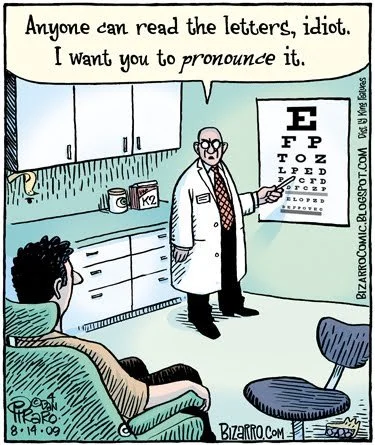In the Loop: September 2023
A Novel Idea for a Newsletter
It's the most wonderful time of the year! September is Literacy Month, and that means it's time for readers to shine. We are excited to read some very big books and some not-so-big books (we all know size doesn't matter) and some strange books and sad books and hilarious books and maybe also a scary book or two. After all, a very wise and very weird Dr. Seuss once said: "You can find magic wherever you look. Sit back and relax, all you need is a book."
At PostScript, we are celebrating all aspects of literacy (phonics! fluency! comprehension! vocabulary!). Check out the playlist if you want to reintroduce yourself to some irregular vocabulary. Read about the peculiarities of adjectives in the Q&A. Find a spellbinding treat among this month's links. We just hope that you get lit!
Editing Q & A: Adjective Order
When more than one adjective appears before a noun, an unspoken quirk of the English language has us place the adjectives in a particular order. Adjectives that describe opinions or attitudes (e.g., wonderful, smelly, ancient) appear earlier in the group, before neutral and factual adjectives (e.g., leather, blue, Albertan). You can absolutely put adjectives in a different order if you want to sound like a total weirdo.
Opinion
Size
Physical Quality
Age
Shape
Color
Origin
Material
Type
Purpose . . .
Noun
An amazing little fragile old oval green French ceramic formal serving bowl.
PS Playlist: Double Trouble
What's the Diff?
There are a lot of sneaky words out there—words with similar spellings, similar sounds, or just similar vibes. Here’s the lowdown on some of those commonly swapped-by-accident words.
Censor (v.): To censor is to review books, films, letters, and music to remove objectionable material—basically, removing, blocking, or otherwise interfering with communication.
Censure (v.): To censure is to criticize strongly or disapprove, to find fault with, or to officially reprimand and criticize.
Cool Guide
Stuff We Like
What does English sound like to non-English speakers?
On filler words (um, er), which not only have important speech functions but also have prescriptions against them that often unfairly target women and younger speakers.
Some of your favorite band names were inspired by classic literature.
Like, whatever. Can we totally rethink criticisms of "valley girl” and up-talk?
Protesting the protestors at Drag Story Hour.
Listen to Stanford University anthropology Professor Jonathan Rosa talk about “raciolinguistics,” or the way that ideologies of race and language shape how we think about others.
Verbatim: A dramatization from transcripts of a legal deposition in which they debate the definition of the term “photocopier.” It’s approximately 1,000 times funnier than it sounds.
The BBC kindly shares with us the 100 greatest children’s books of all time.
New words get added to dictionaries all the time, including nepo baby and shower orange.
Choody-noofy-doopy-poopy; or, how to pronounce things hilariously.
The worst opening sentences to novels: the 2022 prize “winners” are in.
This is probably everyone’s favorite episode of Schoolhouse Rock.
Sometimes there’s no turning back. Once you start a sentence, you probably have to finish it.
She probably gets the gist.
Pay It Forward: Meet Laura Wagner
Laura Wagner is a writer of nonfiction and fiction, cultural anthropologist, archivist, and translator. Her work focuses mainly on the 2010 Haiti earthquake and its aftermath and Radio Haiti-Inter and its archive. From 2015 to 2019, she was the archivist for the Radio Haiti Archive at Duke University. Laura’s writing has appeared in Salon, Slate, Public Books, and Responsible Statecraft, as well as scholarly venues, including sx archipelagos and The Global South. Her young adult novel Hold Tight, Don’t Let Go (Amulet 2015) tells a story of the Haiti earthquake from the perspective of a teenage survivor. You can hear Laura speaking about Radio Haiti and its archive on several podcasts, including Subtitle, Material Memory, and as the Kitchen Sisters' Keeper of the Day. She is currently one of the leads of the Haitian Creole team at Respond Crisis Translation.
Laura talks about translation and cultural literacy over on the blog. Go check it out. Right now!





